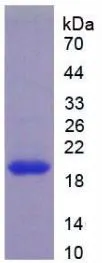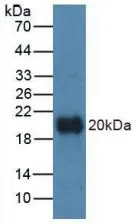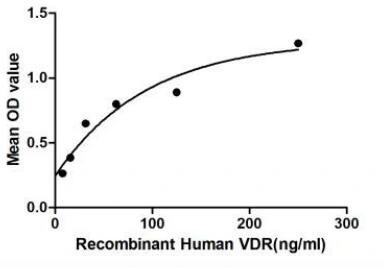
SDS-PAGE analysis of GTX00163-pro Human Vitamin D Receptor protein.
Human Vitamin D Receptor protein, His tag
GTX00163-PRO
ApplicationsFunctional Assay
Product group Proteins / Signaling Molecules
Protein IDP11473
Overview
- SupplierGeneTex
- Product NameHuman Vitamin D Receptor protein, His tag
- Delivery Days Customer9
- Application Supplier NoteVitamin D Receptor (VDR) is the nuclear hormone receptor for vitamin D3. The receptor belongs to the family of trans-acting transcriptional regulatory factors and shows sequence similarity to the steroid and thyroid hormone receptors. It mediates the action of vitamin D3 by controlling the expression of hormone sensitive genes. Besides, E1A binding protein p300 (EP300) has been identified as an interactor of VDR, thus a binding ELISA assay was conducted to detect the interaction of recombinant human VDR and recombinant human EP300. Briefly, VDR were diluted serially in PBS, with 0.01% BSA (pH 7.4). Duplicate samples of 100 microl were then transferred to EP300-coated microtiter wells and incubated for 2h at 37C. Wells were washed with PBST and incubated for 1h with anti-VDR pAb, then aspirated and washed 3 times. After incubation with HRP labelled secondary antibody, wells were aspirated and washed 3 times. With the addition of substrate solution, wells were incubated 15-25 minutes at 37C. Finally, add 50 microl stop solution to the wells and read at 450nm immediately. The binding activity of of VDR and EP300 was in a dose dependent manner.
- ApplicationsFunctional Assay
- CertificationResearch Use Only
- ConjugateUnconjugated
- Gene ID7421
- Target nameVDR
- Target descriptionvitamin D receptor
- Target synonymsNR1I1, PPP1R163, vitamin D3 receptor, 1,25-dihydroxyvitamin D3 receptor, nuclear receptor subfamily 1 group I member 1, protein phosphatase 1, regulatory subunit 163, vitamin D (1,25- dihydroxyvitamin D3) receptor
- Protein IDP11473
- Protein NameVitamin D3 receptor
- Scientific DescriptionThis gene encodes vitamin D3 receptor, which is a member of the nuclear hormone receptor superfamily of ligand-inducible transcription factors. This receptor also functions as a receptor for the secondary bile acid, lithocholic acid. Downstream targets of vitamin D3 receptor are principally involved in mineral metabolism, though this receptor regulates a variety of other metabolic pathways, such as those involved in immune response and cancer. Mutations in this gene are associated with type II vitamin D-resistant rickets. A single nucleotide polymorphism in the initiation codon results in an alternate translation start site three codons downstream. Alternatively spliced transcript variants encoding different isoforms have been described for this gene. A recent study provided evidence for translational readthrough in this gene, and expression of an additional C-terminally extended isoform via the use of an alternative in-frame translation termination codon. [provided by RefSeq, Jun 2018]
- Storage Instruction-20°C or -80°C,2°C to 8°C
- UNSPSC41116100
- SpeciesHuman



